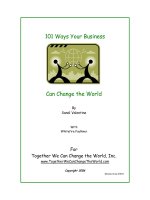Innovation: How Innovators Think and Change the world by Kim Chandler
Bạn đang xem bản rút gọn của tài liệu. Xem và tải ngay bản đầy đủ của tài liệu tại đây (2.1 MB, 394 trang )
Note on the Ebook Edition
For an optimal reading experience, please view large tables and
figures in landscape mode.
This ebook published in 2013 by
Kogan P age Limited
120 Pentonville Road
London N1 9JN
UK
www.koganpage.com
© Kim Chandler McDonald, 2013
E-ISBN 978 0 7494 6967 2
Full imprint details
For Michael
Most.
We are like dwarfs on the shoulders of giants, so
that we can see more than they….
Bernard of Chartres [12th century]
There’s a way of playing safe, there’s a way of
using tricks and there’s the way I like to play,
which is dangerously, where you’re going to take a
chance on making mistakes in order to create
something you haven’t created before.
Dave Brubeck
The theory of relativity occurred to me by intuition,
and music is the driving force behind this
intuition… My new discovery is the result of
musical perception.
Albert Einstein
CONTENTS
Acknowledgements
About the Author
The orchestration of innovation
01 The me-conomics of the GDE
Innovating from the e-conomy to the me-conomy
02 The state of the nation addressed
Taking stock of how things stack up
03 Flat world navigators connecting the dots
04 Me-health
Resolute and committed stakeholders at the heart of the
healthcare industry
05 Innovating educating
06 The power of the me-dia
Demanding what you want delivered when, where and how
you want it
07 Being grounded when the sky’s the limit
Summary
Biographies
Disclaimer: The interviews in this book have been edited for print. All the
opinions expressed herein are strictly those of the respective interviewees and
interviewer (myself); they do not represent the views of any companies or
company affiliates.
ACKNOWLEDGEMENTS
Thanks to:
Michael – for everything.
The McDonalds for sharing their farm and their family with me.
Marco Del Vecchio who was the first to suggest that not only
should this book be written, but that I should be the one to write
it.
Andy Rotman-Zaod and Julian Keith Loren for the introductions
they made and their faith that I would live up to their effusiveness.
Donna DuCarme, Diane Macey, Jason Revere, Russell Watson,
Tracey Gibson and Agnes Benjamin for being bothered to stay
close, even while far away – and Carl Lewis who knows he doesn’t
have to.
Linda Tolbert and Simon Kearns for their energy, enthusiasm and
extraordinariness.
Shelby Piton for knowing where it’s all buried and guarding the
shovel.
Liz Gooster for taking a chance.
All the !nnovators, and their teams, for their inspiration, their
insight, their generosity of spirit and their graciousness in putting
up with a pestering author such as myself.
To all of these wonderful people I owe at least a glass of wine
(though a few may have to wait a couple of years before they’re
legally old enough to drink it). Some of them I owe a winery… I’ll
see what I can do!
ABOUT THE AUTHOR
Kim Chandler McDonald is Executive Vice President of
KimmiC, a company she co-founded with her husband Michael,
which specializes in adaptive approaches, robust technologies and
leading edge innovations. A thought leader, sought after speaker
and advisory board member, Kim is an advocate for disruptive
approaches and transformational trends such as Flat World
Navigation, meHealth and empowered endusers.
Kim has built and maintains a far-reaching network of global
thought leaders. As the world’s first, branded, Flat World
Navigator, Kim was included in the inaugural ‘LinkedIn Power
Profiles – Australia’ list of 2012. Formerly, Kim was immersed in
media as a writer and editor for national and international
newspapers and magazines as well as being one of the
host/producers of the award winning English Breakfast radio show.
Kim specializes in interviewing international thought leaders and
influencers – in particular those who she’d like to share a bottle of
bubbles with.
She loves chocolate, champagne and beer – but not together –
usually…
T
The orchestration of innovation
hree core axioms infuse this book: 1) innovation drives change –
cultural, societal and economic; 2) innovation, in some form,
touches each and every one of us, wherever we may be, as
individuals, communities and societies as a whole; and 3)
innovators deserve recognition, celebration and applause. This
book is my hands clapping. I hope, by the end of our time
together, you join me in my ovation.
I am taking you on a journey around the world. On the way I will
introduce you to innovators who have broken the mould, led the
pack, and moved their own particular mountains in fields as diverse
as business and technology, engineering and education, government
and social policy, media, medicine and more. While they are as
diverse as any other group – as are the areas from which they draw
inspiration – there are traits that link many, if not most of them.
Though at times it may be daunting, innovators are compelled to
tell their truths – whether we, the public want to hear them or not.
Some boldly go where no one has been, or thought to be, before.
Most of them are applauded for it, but that is not why they do
what they do. Innovators run when most are content to walk; this
is true even when their leaps of faith can leave some of us queasy
with anxiety. Without their willingness to delve into the depths of
the unknown, we would all be lessened; their innovations have
changed the way we see, and live in, our world.
Think where we might be if M ichael Faraday hadn’t brought us the
innovation of electromagnetism, or Nikola Tesla the alternating
current. Niels Bohr’s work with quantum mechanics is the basis
for all we take for granted in communication and modern
electronics. Perhaps my favourite historical innovator is Johannes
Gutenberg, he of the precious printing press. His work, which
brought books to the masses, led to reformations in religion,
politics and society as a whole.
Looking forward, innovation will be as important in our next ‘great
leap forward’ as it was during the Industrial Revolution. Without
the steam engine and Spinning Jenny, our world economy would
look much different. In all likelihood the same can be said for those
innovations that are now, or will soon be, presenting themselves. It
is these innovations that will ensure that we survive and, with any
luck, thrive in the new Global Digital Economy (GDE) – and it is
innovators that we have to thank for this.
Together, we’re going to find out what makes innovators tick, talk
and tremble. Perhaps, by understanding these things, we will be
able to understand the future that awaits us all a little more
comfortably. In the interviews in this book you’ll find answers
from artists and authors, engineers and entrepreneurs, doctors and
designers, educators and architects, scientists and explorers of
space, business people, bankers, politicians, printers, and many
more. There are those who focus on the micro, the macro, the
profit, the public, the bold, the beautiful, the richest, the poorest,
the sun, the moon, the earth, and almost everything in between.
There are no right or wrong answers in this book: there is only the
exploration and the celebration of innovation and of how these
world-class innovators rock their roles.
In travelling through !nnovation you also have an opportunity to
explore your own innovative thinking. I begin each chapter with a
‘word cloud’. Look out for these words as you read each interview.
They are the commonalities – the themes, if you will – that link
and lead. They are the warp and weft, the contexts and concepts,
the melodies and harmonies of this symphony of extraordinary,
and extraordinarily innovative, individuals.
Following each main interview I have included a simple ‘Keyword
imagination exercise’. Take five minutes, close your eyes, and see
what thoughts and ideas they inspire. Take some time – some you
time – to allow your mind to wander freely and make an
‘innovation investment’ in yourself. There are no right or wrong
answers, no test to study for – this is your time to delve into the
deep insights shared in these interviews, investigate your own
connection to innovation and explore the potential differentiation
that you can bring to your world, your business and yourself.
01
The me-conomics of the GDE
Innovating from the e-conomy to
the me-conomy
W
e are in the midst of an unprecedented time of change and
upheaval. It is, therefore, a time of fantastic opportunity for
those who act decisively and bravely, and a graveyard for those
who do not. The world is changing irrevocably due to three major
influences and innovations in the business arena – some
incremental, all insistent. First: the era of the engaged and
empowered enduser is here. With their ever-increasing
expectations, this ‘innovation of the individual’ is underlining the
‘me’ in me-conomics and the me-conomy. Second: endusers are
becoming ever more aware of the value of their data, and their right
to own and control it. Third: mobile, agile businesses in the Global
Digital Economy (GDE)/me-conomy are encompassing an ever
flattening world.
The most tragic mistakes one could make are: a) believing that it is
business as usual; and b) that the ascendancy of the West is
irrevocable. That notwithstanding, we’re going to see opportunities
and markets explode exponentially, in both geography and
dimensions, as the inhabitants of the ‘Majority World’ – where the
majority of the world’s population lives – not only come online
but become avid competitors, not just consumers. It is an exciting
frontier that is ever more impossible to opt out of. With that in
mind, let’s look at these issues of innovation in more detail.
In the late 15th century the Gutenberg Press was an innovation
that began a societal revolution. It removed the need for cloistered
experts – the technocrats of their time – by disseminating the
printed word and democratizing knowledge, leading to what could
be described as the glimmers of what would eventually become a
knowledge-based economy.
Another ‘Gutenberg-esque’ revolutionary innovation is upon us,
and is being made manifest by the transformational technologies
enabling enduser empowerment. It is distinguishing itself in various
ways, perhaps most importantly in underlining the power of the
economies of attention and information/data ownership –
foundational pillars of the me-conomy and me-conomics, which
put individuals, rather than institutions, at the heart of the GDE.
The new GDE/me-conomy is about more than ‘deets on Tweets’
and Facebook pages, which are simply messaging platforms tuned
to trawl users’ data. Rather than transformational, these platforms
are transitional steps in the evolution of me-conomics. They lack
the depth and breadth of functionality to fully embrace and
support the needs of the new, knowledge-based GDE. To thrive,
rather than just survive in this milieu, collaboration will be a
necessity for businesses of any size – this equates to selectively
sharing both knowledge and data. Undoubtedly, data has
commercial sensitivity and value. As such, businesses will need
tools that enable simple, extremely secure cooperation and
collaboration at a micro and macro level – by employees, suppliers,
channel partners, consumers or customers – to do deals and make
money in a far more dynamic way than has ever been seen before.
Another hallmark of successful companies in the GDE/me-conomy
will be an understanding that, beyond social networking, they need
to create and maintain thriving business communities. These
communities are at the heart of this opportunity for the evolution
of social platforms and the spread of their influence. And evolve
they must, along with their business models, in this era of the
empowered enduser.
Endusers have been, and will continue to be, more and more
discerning about what content is relevant to them. As ‘push’ sales
campaigns become more and more irrelevant, and fall on
increasingly deaf ears, innovations such as the semantic web, Web
3.0 and social media will come to the fore. Alone, none of these
innovations is a complete solution. However, when these tools are
used effectively together they can empower businesses to engage in
democratized, holistic, marketplace-based, two-way relationships
that encapsulate the business offerings that consumers/endusers
understand and value. These offerings will entail individually
targeted materials and messages that drive engagement and deliver
personalized services to endusers who are going to demand micro-
pitches and requests that are focused purely on their personalized,
customized wants and needs. The organizations prepared for this
change in the balance of power will effectively enhance and expand
the relationship between their business and their communities –
and the empowered endusers within them.
The advantages of this new type of relationship are myriad, and go
far beyond sales figures. However, they do take work and they
involve the evolution of ROI, in as much as no longer will ROI
mean ‘Return On Investment’: in the me-conomy it will equate to
‘Return On Involvement’; and the judicious use of innovative tools
such as semantic web, Web 3.0 and social media will enable the
creation and maintenance of a meaningful dialogue between all
parties. These innovative tools do more than create a medium for
businesses to learn more about, and from, the endusers within their
communities – and in doing so, create productive, high touch, high
value networks, which will be the cornerstone of enduser
engagement, which everyone is looking for. They also enable the
empowered endusers to find, refine, define, share, manipulate and
mesh information – in particular their own information.
Current business models find many organizations, some more
obviously than others, ‘borrowing’ enduser data and profiting from
it. To my mind, this situation is not unlike allowing a random
stranger to walk into your home, rummage through your drawers,
read your diary to find out what your likes and dislikes are, and
then sell you items they think will appeal to you. For many
companies, their current business models are dependent upon such
borrowing continuing. Yet, I posit that it will not continue in its
current state for much longer, as the new GDE and me-conomy
marketplace matures.
It will not be long before endusers grasp that their data is their
intellectual property. Empowered by the innovative evolution of
authentication and authorization tools, they will be able to decide
when, where and with whom their information is shared – or if it is
shared at all. This could result in the cessation of ‘phishing’
communications, a reduction in internet predators, cyber-bullying
and identity theft. Data and knowledge, already acknowledged to
be valuable, may become a unit of currency in and of itself and be
traded as such – perhaps in a ‘marketplace of ideas’. It is not a
huge leap to suppose that businesses, currently ensconced in the
‘borrowing business model’, may be forced – either by policy or
by the increasing me-conomic acumen of endusers – to share the
revenue they make from using this data.
With innovative tools, techniques and technologies empowering
engaged endusers, the me-conomy is quickly becoming a central
pillar of a flattening world’s GDE. As such, it is not just ‘the
borrowers of data’ who must rethink their business models. Be it
by restructure, redesign or reduction, the bastion of business as
bricks, rather than clicks, has forever changed – an online presence
is not just the norm, it is an undeniable necessity.
The mobile, online market is, increasingly, a major driver of
national economies and employment. The changes that accompany
this are exponential in their effect. While the multitude of
competitive advantages taken for granted by Tier One and Tier
Two companies are now gone, new, potentially ubiquitous
advantages have arrived in the form of transformational
technologies that are available to anyone able to access them
through a connection to the web.
Of course the new GDE and marketplace are far more than e-
commerce, which is simply a function and extension of the ‘bricks
and mortar’ philosophy. e-Commerce is not an innovative and
radical rethink, as it steps back from positing that the web will
soon be, for all intent and purposes, the essential economy of the
GDE and the ‘real’ world will simply exist to deliver what is
agreed upon online. Coupled with the ever increasing acceptance
of, and reliance upon, remote working and workers, this is proof –
if it were needed – of the ever-increasing flattening of the world and
the inherent me-conomics of the GDE. At an individual level, from
mid-level employees to C-Level executives and above, the change is
manifesting itself with a mighty wallop. The PHDs (Poor, Hungry
and Driven) – as described by Matt Barrie in his interview (see
page 22) – are chasing, and catching those, generally Western,
MBAs (M arginalized By Audacity). The fact is, for years people
have been taking their work home with them, and using their own
devices to do so. Instead of resisting this process, it is incumbent
upon mobile, agile organizations looking to thrive in the GDE/me-
conomy, in the public or private sector, to embrace it.
It is true that existing approaches to corporate security do not
always lend themselves to this embrace – yet. However, innovative
technologies that are months, rather than years away, will enable
the leveraging of legacy systems and existing capabilities,
empowering said organizations, regardless of size, to surf the me-
conomics of the GDE. There is a massive wave of opportunity
coming, which can increase the stickiness, satisfaction and, most
importantly, opportunity for all parties to profit.
What must also be acknowledged is that the number of people at
this party is about to increase by orders of magnitude due to the
advent of innovation in and around the use of mobile technology.
There are over 6 billion mobile phone subscriptions worldwide;
more than 5 billion of those are in the Majority World. These
phones are currently being used as wallets, maps and tools to
compare prices, etc. With the technology only now being released,
they will, more and more, be used to recruit employees, do
business, and collaborate on joint ventures. Smart phones and
tablets will be the tools of choice to empower budding
entrepreneurs around the world.
As the business world becomes flatter and horizons and time zones
mean less and less, the Majority World is coming online and they
are on point to take advantage of these tools’ inherent agility and
mobility. Traditional, massive multinational organizations have
now got competition in the guise of new, mini-multinationals as
companies on every continent embrace web-based technologies and
social media, amongst other strategies. As such, they are becoming
equally competitive on the commercial playing field of the GDE.
Together, innovative technologies such as social media, Web 3.0
and the semantic web have changed the game. They will continue
to do so, with ever increasing speed and power, in the competitive
and cost-focused me-conomy of the GDE.
From here on in, businesses cannot believe that doing nothing is an
option; it’s not. Yes, we are in a time of flux, but that is precisely
the time when businesses that seize upon the opportunities that
innovation provides can come to the fore. Thinking you can sit
back and watch this brass ring pass by is folly: if you don’t grab it,
someone else will. Organizations that don’t increase their
engagement with and empowerment of their endusers – who don’t
ensure that they are adaptable, agile and adept in the mobile arena –
are likely to lose their slice of the GDE/me-conomy pie.
The following interviews are with business thought leaders and
innovators from around the world. Each of them defines and
delineates aspects of success and awareness of both the pitfalls and
potentials inherent in this time of great opportunity.
Innovators speak
Michael McDonald Co-founder and CTO of KimmiC
Since the
late
1990s IT
has been
perceived
as
steadily
failing to
deliver
simple
business
models
and
degenerating into a bureaucratic, inscrutable ivory tower
when it comes to the strategic direction of the business.
This, coupled with a changed world, in which billions are
entering the new Global Digital Economy (GDE), means we
have completely new business challenges and opportunities
that aren’t met by existing IT systems and approaches. The
fact that Facebook and Twitter could hand the established
players ‘their lunch’ shows how inadequate moving 1980s
business concepts forward has been.
The problem has been: how to empower endusers in the new GDE? The lazy
solution has often been the crux of the problem: the dreaded app. Why are apps
the problem? Because they create and control their own abstract view on the
world – this almost never is the same from app to app. The vendor has control
over their abstract world and woe-betide any company that actually want
access to, and control over, their underlying data.
Business units around the world are asking a simple question: ‘The Cloud
seems simple, I can access it on my phone or tablet – why can’ t IT be the
same?’ It’s a brilliant question. Everything should be simple to access, 24/7,
via mobile devices and individually customized for the enduser – not for
marketers with a segmented push view on the world.
I created FlatWorld technology to answer the question: how can I (a person,
business unit, company, etc) cooperate and share data simply (ie via a phone),
securely (everything is encrypted, goodbye search engines, data miners, etc)
with people, processes and the dreaded legacy applications. I want to do this
in a mobile space, which is not only accessible 24/7 but is also simple to audit
and, most importantly, where everyone can ‘play well together’ , ie enabling
moving/dynamic cooperation from all parties. This, combined with that ability
to match any interaction to a business model of your making equates to the
ability to create multitudes of high value, high touch markets; thus giving
your company, or your data, a real shot at getting a hold in the new Global
Digital Economy.
To build this and meet some pretty exacting criteria, especially from an existing
‘Tier One’ company perspective, was more than a challenge. This, combined
with leveraging dual licence technologies means that the underlying
economics of FlatWorld are cheaper than anyone – so it lives up to its name
and ethos: creating a level playing field for any and all who want to engage in
the GDE. Interesting times, yes – but doing nothing during this time of great
change, is not an option.









